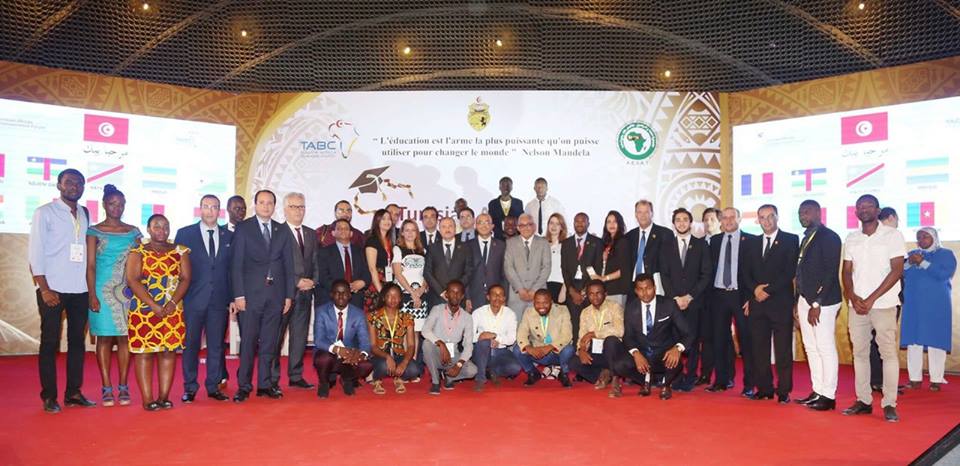
The work of the Tunisian African Empowerment has made it possible to put the spotlight on Tunisia as a destination for higher education for foreign students. Opportunities to shovel, deficiencies to the ton and a vicious circle that struggles to be broken. By Amel DJAIT
The point is not here to mention the quality of education and training in Tunisia. The opportunities of this market were discussed during the work of the 1st Tunisian African Empowerment, held on 22 and 23 August 2017, at the Palais des Congrès in Tunis. Organized by the Tunisian-Africa Business Council (TABC), in partnership with the Ministry of Higher Education and Scientific Research and the Ministry of Training and Employment, as well as the Association of African Students and Trainees in Tunisia (AESAT), the forum was mainly an opportunity to discuss the disadvantages of the destination to receive African students.
Slow administrative procedures for obtaining visas and residence permits, racial segregation, unavailable information, rising costs, difficulties in obtaining internships, difficulties in transport, housing, integration … .A listening to the numerous testimonies of students during the forum, one no longer wonders why the number of African students dropped from 12,000 to just 5,000 in a few years.
Better yet, if Tunisia counts on its sub-Saharan students to make ambassadors, it is missed! First, there is no database on them. Then those who occupy positions of influence today are just barely solicited. It must be said that during their stay in Tunisia, they make life so difficult, that many decide not to return. To date, many African students, and when they can, change course or study destination. When the destination becomes aware of its dysfunctions, new destinations have managed to implement a more aggressive strategy and tear the students out with visa for two years and offers more attractive.
During the forum, the testimonies succeeded and resembled that they emanated from ministers or young students still in formation in Tunisia, all evoke difficulties. On the panels, the speakers of the various government departments were also in the observation. They were struggling to announce concrete measures. Worse still, we note the lack of donors. Forgetful of the organizers or disavowal of the latter who still do not see any significant commitment? The question needs to be asked.
However, in the corridors and at the seat of the government, it is said that the political will is there and that the deployment of Tunisia in Africa is no longer a sight of the mind! Except to date, on the contrary, the lack of will breaks the students enrolled in different private courses (4000 students) and public (1000 students).

The President of the Togolese students in Tunisia, who in full plenary during the forum is indignant: “Where is this political will? What do you do and offer? What have you to announce? What concrete action have you taken? The same is true of the Association of African Students and Trainees in Tunisia, whose President says: “The debt of African students was expected to be canceled by the Head of Government! Not even ! ”
On the side of the TABC, President Bassem Loukil can say and repeat that Tunisia’s future is linked to Africa, we listen, acquiesce, support, attend cocktail trips and eat small ovens …. ? How can we eliminate all the dysfunctions of our administration? How to take advantage of the estimated manna of which UNESCO estimates a 6% increase in expenditures in terms of expenditure on education. African students enrolled in higher education have increased from 6 million to 15 in the last 15 years.
During this forum, the Ministry of Foreign Affairs announced plans for the granting of visas, that of higher education to include this component in its Assizes planned for the month of November 2017. Tunis Air, on the other hand a major deployment on Africa in more than 6 destinations that it programs to date.
For the moment, the most important thing to remember is the following:
- Africa has one of the highest rates of student mobility.
- 1 of 16 Africans leave their country of origin to study abroad.
- In the absence of a local offer, the rate of access to post-bac university is 18% in sub-Saharan Africa, while the world average is 76%.
- The ten countries that devote the highest share of GDP to education worldwide are African. But there is the question of the employability and absorptive capacity of labor markets in Africa.
- Nearly 20% of MOOC is consumed by Africans, but technological integration remains low in Africa.
- Sub-Saharan Africa does not have enough engineers and scientists. Only 2.4% of the world’s researchers come from Africa, whereas it represents 16% of the world’s population.
- Innovation must therefore be an integral part of the strategy to be developed in order to integrate into the knowledge economy while renewing Africa with its agricultural and mining vocation, in a sustainable and equitable way.
Here are the main recommendations and fields of action selected:
-Making Tunisia a knowledge hub, by setting up an institutional platform for governance of the Education-Training-Higher Education & Research sector.
-Develop bilateral and multilateral cooperation through specific programs such as the exchange of students and teachers / trainers (in both directions)
-Putting Technology at the heart of the Education system and developing an African Technology Transfer strategy that works to achieve technological self-sufficiency.
-The match between the supply and demand of skills and the employability of young people requires large-scale information sharing and requires the involvement of the public and private sectors in the orientation of academic and scientific streams.
-Better serving sub-Saharans in Tunisia means better serving Tunisian students.
-The conditions for the reception of foreign students in Tunisia should be given special attention.
Mass is said! If it is often said that gait and awareness are important, it is vital to take action. The strategy seems to be increasingly clear. Operators are ready and current governance seems to be converted. Only one parameter remains difficult to be pre-empted by Tunisian politicians and administration; Time !
Time plays against us.
Tunisia has been a pioneer in the banking sector in Africa. What did she do? Tunisia has been a pioneer in terms of higher education for export. What can she and will she do with it?

 َAbonnez-vous
َAbonnez-vous

